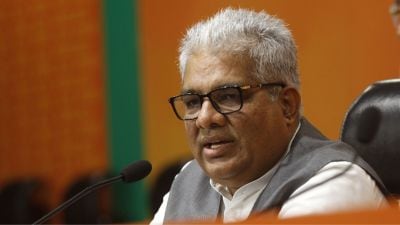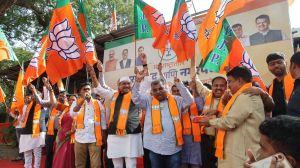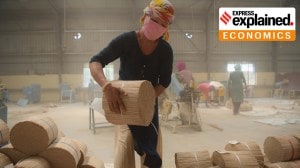The Pulitzer-winning writer has always had a special relationship with Rome — it is where she found love and a new language; where she charted an entirely new course in her intellectual life, writing exclusively in Italian. But the Rome she portrays in this collection of nine stories, (six of which she has translated herself from the original Italian to English. The other three have been done by Todd Portnowitz) is more noir, less romantic. It is the story of nameless foreigners – outsiders – trying to find a foothold in a city that is lonely and less than inviting, sometimes even openly, brazenly hostile, to them. In this interview, Lahiri, 56, speaks of this Rome of light and shade, her ambiguous relationship with borders and why she has stopped using names for her characters. Edited excerpts:

You have mentioned that the title of Roman Stories, your new collection of short stories, is a tribute to Alberto Moravia’s book of stories, Racconti Romani (1954). Did you also intend your book to be a thematic retelling of sorts, about what it means to be an outsider in Rome today?
Moravia writes about Rome in a very different moment historically — in postwar (World War II) Italy. It’s the economic boom, things are going well, comparatively speaking. But his stories are full of characters who are struggling and hand to mouth, often quite lost, either literally or existentially. So, his Roman stories are a remodel in that sense for me. However, using his title for my own collection of stories is a gesture because everyone associates Moravia rightly with the city of Rome. He was born there, he was raised there, he lived there, he worked there, he was a fixture of the literary establishment there. And so, for him to write a cycle of stories called Racconti Romani seems quite natural because he’s part of the texture of the city, whereas my choosing that title for my stories is sort of emphasising my position as a writer who is a foreigner in Rome. Just to have my name on the cover with that title in Italian is significant because this is a person from the outside who is going to talk about the city of Rome, which has been narrated and described and depicted countless times — never to anybody’s full satisfaction. It was a leap to do that and it was the first time in my writing in Italian that I decided to declare the fact that I was actually talking about Rome, even though I am, in some sense, a visitor, a guest. The fact that I was writing about Rome was welcomed by the Italian readership as an interpretation of the city and its problems because, as we all know, it’s often the gaze of the foreigner, the outsider, that lends perspective on a place. When we live in it from day to day, we can become immune to its problems.
Ironically, the writing of the book in English has gone against the expectation of some people, because I draw more light to the darker sides of the city which people don’t really want to seek out. So it made some people feel like she doesn’t really know this city.
You have a special relationship with Rome. Have there been moments when you felt, like some of the protagonists in Roman Stories, an outsider?
For a number of reasons, including having a stronger relationship with the Italian language, Rome has also been a city that’s been calling to me for much of my life for inexplicable reasons — always sort of in the back of my imagination, or at the centre of it. (But) I always feel like an outsider everywhere. That’s just the way it is. In spite of that reality, I have felt rooted in Rome in ways that I haven’t been able to feel in my life previously, But I make no illusions about the fact that I’m an outsider wherever I go.
Story continues below this ad
The transition from Whereabouts (2021), your previous collection of short stories, to Roman Stories, is darker, more reflective of the closing in of walls in Italy, but also around the world. In what ways did you see this identity politics play out in Rome?
The stories in this book were written more or less at the same time as Whereabouts. So these two books grew together. I think one was more of an interior journey and the other was another side of me observing and responding to things that were happening out in the world — reactions towards immigration, towards episodes of racially motivated violence, all of these kinds of things. I had been observing these from the very beginning of my time in Rome. So there was no period of not being aware of the very problematic side of the Italian political landscape and the landscape in general in Europe and in the United States. I mean, when I left the US (in 2012 to live and work in Italy) it was (President Barack) Obama. A few months later, he was elected for his second term. But when I went back (to the US) in 2015, things shifted to make 2016 (the election of Donald Trump) possible.
You spoke of how you feel like an outsider everywhere. Does that explain your fascination with outliers? All sorts of border dwellers populate this collection and it’s a theme that has run through your books.
I think these themes have been with me from the beginning because I have always been acutely aware of borders and what they mean, questioning them and questioning how they get made. Being raised in the United States as a child of immigrants is to be always conscious of borders. I have a series of borders, literal ones and cultural ones, going both ways because you’ve been raised in a context that is right outside of the place. And then going back to India made me aware that when you were on the other side of the border, you didn’t fit in there either. Whether going back to Kolkata or coming back to Boston, for me, these phrases never made any sense, because I never knew where I was going back to. Neither of those places was home for me.
Story continues below this ad
Given the amount of travel that I experienced as a child in the 1970s-80s, you were also always aware of actual borders, even though nothing terrible ever happened. No one was ever pulled aside and interrogated, things that you hear about, that do happen to people. But there was always the threat of it somehow, there was always so much apprehension. So, the border has always been very ambiguous for me.
Your last few works mostly leave the characters unnamed. Is that an effort to shrug off this baggage of identity, the ambiguity you feel about it?
I haven’t used names in any of my Italian work. It’s a way for me to question the associations of names with identity, with race. I wanted to get past this because it’s so reductive to look at a name and to draw all sorts of assumptions about the person. I’ve lived this because I had, obviously, a foreign name in the place where I was raised. With those assumptions come very simplistic readings, especially in the Italian context and in the United States, too. I have seen how people react if I say — even if they haven’t met him in person — my husband’s name, Alberto. They will assume he’s Italian, because that name is part of their name glossary, even though he’s not Italian. People want to seek their own kind, it’s a kind of primordial urge. They want to recognise their own, claim the person. They want to say, ‘Oh, he’s one of us’. And this is comforting in a way. I know this because I also saw my parents search for people with Indian, Bengali, names.
So, I feel that not using names makes it more of a challenge to pinpoint the person’s national identity, physical appearance, race and all of the rest. Even in Whereabouts, I was struck when many people assumed that it was an Italian character. There’s no indication in the book that she is Italian by, shall we say, origin. She could be from anywhere in the world. But she happens to live in Italy and she speaks Italian. This is the space I’d like to open up a little bit more in my work. In Italy in particular, the question of who is Italian is very narrow in terms of the preconceptions around it. It is problematic, given that there is such a large immigrant population established in Italy, and so many people who have ethnic roots in other places in the world, but who are born and raised in Italy, and think of themselves as Italian. But they are not acknowledged as Italian by the government.
Story continues below this ad
Many of the stories in this collection capture the casual cruelty, including in children, that seems to have seeped into our daily lives. How much of your own experiences do you draw upon for these accounts and, as a writer, how do you reflect upon this state of affairs?
Cruelty is always with us. I think it’s triggered often by the fear of the other. I was not immune to it when I was growing up. I felt that, in a way, it was the children who made it most clear that my family came from far away and that everything about us was strange. When one looked at it closely, there was just a lot of trying to hide and sweep into the corners things about us. Even things like the odours in our house, because my mother would make Indian food and the embarrassment about that — what would people think? What would they say? And it was really the children. No one came to our house who was American, apart from my friends. My parents had very few friends who were not Indian and mostly Bengali. I was terrified as a child of what other children would say to me, how they would interpret who I was, even small things like how I looked, etc. As an adult, I asked myself what enables a child to be cruel — it must be something not inherent to the child, but something learned from the parents?
Do you think this uncertainty about who one is has now petered off, hardened into something more rigid?
Everyone I know is conflicted about identity and it is something that we should be conflicted about. Identity is not a fixed entity, not something we should comfortably take for granted. It is something we should always be questioning, sorting through, taking stock of, just being aware of how much is handed down, how much can we trim back and where can we take it to. My parents and their generation clung to an identity, but then also reshaped who they were because of life circumstances. There’s an emotional fallout from that. Everything that happens from generation to generation, the kind of betrayals, the smaller and larger ones that are possible when we live our lives and when our identities will inevitably shift, are worth thinking about.
Story continues below this ad
Language can be both a strength and a weakness. How have you discovered yourself in the many languages that you speak and understand?
It’s allowed my identity to evolve. I think the more languages one knows the more we are liberated from the pressure, the expectation to have one language, and therefore, one identity as a point of reference. This idea is not only limiting, personally, but it’s dangerous, politically. We are seeing that rhetoric everywhere we turn.
You mentioned how the publication of the book in English raised questions about your authority to tell the Roman story. How do you react to criticism?
Nobody wants criticism, nobody likes to be attacked, nobody likes to be dismissed, or talked about in ways that are condescending. But I gather that’s what critics do and feel that they have a right to do. I’m aware broadly of the reception my books have. The Italian works, in general, have been questioned for all sorts of reasons. I think that this points to the whole question of what it means to write in another language, in a learned language and whether or not we can trust the writer because of their entry into a new language. It’s interesting intellectually to think about why the Italian work is being questioned as less authentic than work I write in English. In most public events, people ask, will you ever write about the Indian diaspora again? It strikes me because I feel like I have written about the Indian diaspora, again, in Roman Stories, for instance, but because they are not in primary colours, because the portrait is more subtle here, but in some sense also more acute, people are still questioning this idea of if I have gone far away from my roots, shall we say. On a good day, I find the questions fascinating and stimulating, because part of my job as a writer is always to reflect on how human beings think, what they are made of, why they react to things the way they do. On a good day, I try to take those reactions and put them into my toolkit to better understand humanity.
Story continues below this ad
You teach at an American university, and, at the moment, there are crackdowns on freedom of speech on campuses across the US over the war in Gaza. As a teacher, what would you tell your students about free speech or the right to protest?
I’ve been experiencing this acutely this past fall. I’ve been teaching at Barnard College, which is part of Columbia University, and that’s been a campus that has been roiled by the reactions to this conflict in Gaza. Student groups have been banned. It’s been extremely troubling. There have been efforts made to resist this type of silencing of acts of protests and I talk about this. Of course one has to be diplomatic because the question is incendiary and we have students from all backgrounds in our classrooms. But I think the point or energy of a university is freedom of intellectual inquiry and freedom of speech. So these values have to be, must be, at the centre of every discussion, even if they’re going to be controversial, even if they’re going to be difficult.

































